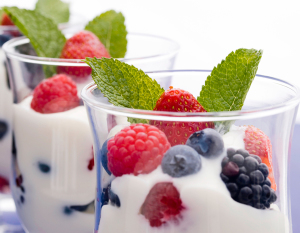 Yogurt
Yogurt
 Spoon it, dip it, freeze it, sip it. The options are endless with yogurt! Just like milk, a serving of yogurt provides key nutrients you and your family need such as calcium, protein, vitamins, and minerals. It goes well with a variety of foods, is versatile as an ingredient, and tastes great too!
Spoon it, dip it, freeze it, sip it. The options are endless with yogurt! Just like milk, a serving of yogurt provides key nutrients you and your family need such as calcium, protein, vitamins, and minerals. It goes well with a variety of foods, is versatile as an ingredient, and tastes great too!
How does yogurt compare to other foods nutritionally? What’s all the buzz about Greek yogurt? How can you use yogurt as a healthy substitute in your recipes?
These questions and more are answered in our yogurt booklet! Download it now for ideas on how to fit yogurt into your diet.
Fast Facts about Yogurt
 Yogurt is an excellent source of protein, calcium and potassium.
Yogurt is an excellent source of protein, calcium and potassium.- An 8 oz serving of yogurt can contain between 5-23 grams of protein, making it a great choice for those looking to add protein to their diet.
- Yogurt contains live and active cultures, or probiotics. Probiotics can help maintain a healthy digestive system.
- It can be a great dairy option for those that have lactose intolerance because its live and active cultures help with digestion and it naturally has less lactose per serving than milk.
- Greek yogurt is thicker than traditional yogurt because it is strained differently. It can also contain up to double the protein of traditional yogurt.
- Trying to reduce the amount of added sugar in your diet? Mix plain yogurt with crushed fruit, like a mashed banana, to add natural sweetness, fiber and extra nutrition!
- Any type of low-fat yogurt, Greek or traditional, fits into a healthy diet.
- Yogurt can be used as a substitute ingredient for lots of things. Check out this handy guide!
Discover new ways to add dairy to your diet with these delicious recipes from Must Be the Milk and these recipes from National Dairy Council.
